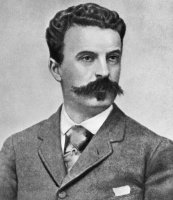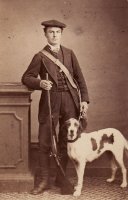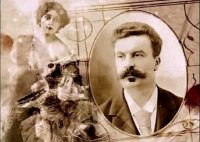
 Guy de Maupassant was a French writer whose work was in touch with naturalism. The man managed to make a fortune from literature. Insatiable in love, he turned most women into characters in short stories, novels and novellas. He was also a keen traveler, having toured Europe and visited remote corners of the world.
Guy de Maupassant was a French writer whose work was in touch with naturalism. The man managed to make a fortune from literature. Insatiable in love, he turned most women into characters in short stories, novels and novellas. He was also a keen traveler, having toured Europe and visited remote corners of the world.
The full name of the writer is Henri-René-Albert-Guy de Maupassant. He was born in the estate Miromenil near the town of Dieppe in a family of poor noblemen. Grandfather went bankrupt, his father Gustave de Maupassant had nothing else to do but go to work. Served as a broker at the stock exchange, was an aesthete, loved art, painted with watercolors. He was known as a dandy and a man of the world.
But married his own opposite - childhood friend Laura Le Poitven differed serious and thoughtful character. However, the couple did not get along under the same roof. After giving birth to the second heir, the woman with her sons left to the seaside town of Etretat, where her villa was located.
Maupassant's childhood flew by in carelessness and idleness. The boy was left to himself, so he spent a lot of time outdoors. From an early age he learned to fish, made friends with farmers, sailors, fishermen.
At the age of 13, freedom ended. Mother arranged for Guy to go to a theological seminary. The strictness of the institution did not like the freedom-loving teenager: he ran away several times, constantly mischievous, in the end, the absent-minded seminarian was kicked out in disgrace.
Parents decided to try their luck in the Lycée of Rouen, where and set up her son. Here the young man took root, showed a bright aptitude for science and art, and most importantly, found guides to the world of literature. His first mentors were the poet Louis Bouillet and the writer Gustave Flaubert. After lyceum, the young man went to the capital of France, where he entered the Faculty of Law. But the studies were interrupted by the war with Prussia.
Maupassant went through the war as a private, at this time ignited a passion for astronomy and natural history. Returning home, could not continue his studies - there was an economic crisis, his parents were unable to pay for college. He had to enter the service. Guy gave six years to the Maritime Ministry, barely making ends meet on a meager salary. The thing that really took his fancy was literature.
Working in the Ministry, Guy de Maupassant under Flaubert began to make the first steps in the writing field. For several years, he only did what he wrote, destroyed manuscripts and sat down again at the pen. Flaubert insisted that the young man every day to spend time every day "on the muse", in his opinion, only so you can succeed. And at first forbade the student to print. With the help of a mentor Maupassant moved from the Maritime Ministry in the department responsible for public education.
The first publication in the creative biography of the novice writer happened in 1875. Novella "Hand of the corpse" was published in the newspaper under a pseudonym, as well as the poem "On the shore", which four years later in a revised form made a lot of noise and brought the author to court. The work, which received a new title - "Girl", representatives of supervisory authorities considered pornography. Flaubert once again came to the rescue, drafting a letter of justification.
In 1880 saw the light of the story "Pyshka" which was included in the collection. In this volume, along with the debut work of Guy neighboring stories by Emile Zola, Joris-Karl Huysmans and other French novelists.
The story made a sensation in the circles of critics and readers subtle irony and brightness of characters. At work, he was even given a vacation for six months. Following "Pyshka" was published poetry collection "Poems", after which he resigned from the post of an official and worked in a newspaper.
 In the 80's Maupassant traveled a lot. Impressions of Corsica, Algeria and Brittany poured into novels, short stories and essays. The everyday life of the Corsicans, for example, inspired the book "Life". For the last dozen years, which took fate, the writer has managed to create a scattering of works.
In the 80's Maupassant traveled a lot. Impressions of Corsica, Algeria and Brittany poured into novels, short stories and essays. The everyday life of the Corsicans, for example, inspired the book "Life". For the last dozen years, which took fate, the writer has managed to create a scattering of works.
and literary scholars emphasize "Pierre and Jean", "On the Water", "Under the Sun", stories and novellas "Necklace", "Moonlight", "Testament" and, of course, the novel "Sweet Friend". Guy de Maupassant rose to the forefront of the stars of French short stories.
Readers adored Maupassant, he managed to make writing a lucrative profession. In a year, the writer earned up to 60 thousand francs and lived on a wide footing, not forgetting to financially support his mother and brother's relatives. By the end of his life, he had amassed a decent fortune, acquired numerous real estate, kept several yachts.
The secrets of popularity for contemporary writers were obvious. Zola noted that Guy skillfully plays on feelings, talks to the reader good-naturedly, and if he uses satire, then without a tinge of malice and harshness. Leo Tolstoy explained the phenomenon of Maupassant's fame by the fact that the Frenchman saw "the meaning of life in a woman, in love".
The writer was on friendly terms with distinguished colleagues in literature. Closely approached Ivan Turgenev, Paul Alexis, Leon Dierks and other famous personalities. He was considered a good comrade and a loyal friend.
Part of the works of Guy de Maupassant became the basis for feature films. For the first time his work came to life on film in the Soviet Union. In 1934, director Mikhail Romm shot a silent picture "Pyshka". The screen version of "Sweet Friend" was presented by Willie Forst (1936), Pierre Cardinal (1983) and Declan Donnellan (2012). The latter film starred Hollywood stars Robert Pattinson, Uma Thurman, Christina Ricci.
Guy de Maupassant had a bad heredity. His mother suffered from psychosis, and his younger brother died in a psychiatric clinic. The writer all his life was afraid of insanity, but this fate did not pass. In addition, his health undermined excessive mental stress, because he wrote without stopping.
Guy struggled with headaches, later and nervous seizures. In 1891, the man tried to commit suicide by cutting his throat. Got into a mental institution, and two years later he died. The cause of death was cerebral palsy. The author, who could truthfully and touchingly write about love, he did die before reaching age of 43.


